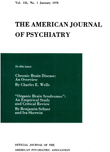ANOREXIA NERVOSA: METABOLISM AND ITS RELATION TO PSYCHOPATHOLOGIC REACTIONS
Abstract
In four patients with anorexia nervosa, investigations were made on (a) the relation of the psychopathologic reactions to the somatic changes, and (b) the energy metabolism and the absorption and metabolism of food stuffs.
Weight changes were found to be the resultant of the caloric intake and energy output which were influenced considerably by anxiety and resentment. Anxiety was manifested physiologically by a change from a slow pulse to tachycardia, increased hyperkinesis, and decrease in glucose tolerance without characteristic changes in appetite.
Observations on the metabolism of various dietary constituents gave no evidence of a "primary" metabolic disorder. The balance of energy changes was similar to that seen in inanition. During most periods the intake of calories was abnormally low, but even with a diet which would have been adequate for the average normal person weight could be lost because of muscular overactivity induced by anxiety. Thus, most of the symptoms of anorexia nervosa can persist without there being an actual anorexia.
Access content
To read the fulltext, please use one of the options below to sign in or purchase access.- Personal login
- Institutional Login
- Sign in via OpenAthens
- Register for access
-
Please login/register if you wish to pair your device and check access availability.
Not a subscriber?
PsychiatryOnline subscription options offer access to the DSM-5 library, books, journals, CME, and patient resources. This all-in-one virtual library provides psychiatrists and mental health professionals with key resources for diagnosis, treatment, research, and professional development.
Need more help? PsychiatryOnline Customer Service may be reached by emailing [email protected] or by calling 800-368-5777 (in the U.S.) or 703-907-7322 (outside the U.S.).



